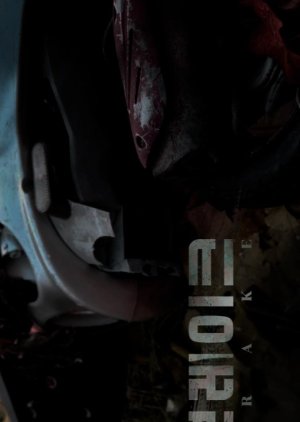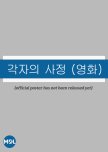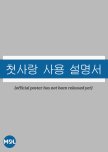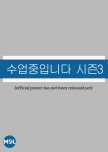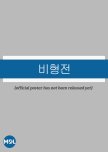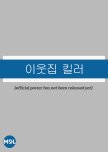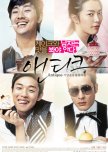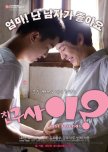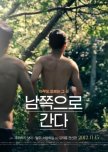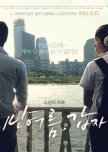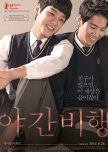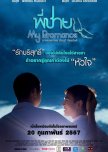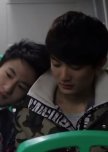
Angst stemmed from a society that shuns
The entire movie was a cry for help, it is about two boys handling their inner demons in very different ways, one taking to recklessness and the other latching on to even the slightest bit of affection, so much so that it turns to obsession...It was heartbreaking to see one having only himself to talk to and him recording those conversations on his camcorder, while the other was seemingly popular but he knew that no one cared much for him and rather he garnered respect by evoking fear in others...The way they met and how it piqued their interest of wanting to get to know each other was quite precious but was made out to be something so much more complicated, leading to them being ridiculed by many...This caused him to distance himself from the friendship, which the other couldn't seem to handle...he turned aloof, while he turned more and more obsessive...his last desperate cry to his mother was so pitiable and painful, yet no one helped him through that and he ends up doing something which I will probably never understand, but with that he surely destroyed his last chance of keeping himself sane...Overall it was disturbingly real and although I cannot condone his final decision, I do not have the right to judge him for it...
The direction was seamless and as a cinematic experience it was thought provoking and quite wholesome...It made me feel terrible for ever having judged someone without knowing their circumstances, since we rise by lifting others and not by pulling them down...
Was this review helpful to you?

The love of two young people and the homophobic South Korean society
'Brake' (native title 브레이크), the LGBT+-themed romantic and psychological drama directed by South Korean filmmaker Yoo Yong-hwan, tells the story of self-discovery, love and obsession of Byun Shi Woo, a shy and fragile teenager whose only hobby filming his daily life with a camcorder, and he will live a heartbreaking love story with Ha Joon, his classmate and motorcycle racer, who has earned the respect of others by imposing himself through fear.Shi Woo's life is sad and monotonous. Abandoned by his parents in an orphanage, he spent his childhood in foster homes. Without a circle of friends or relatives, the decontextualization of his environment and where he comes from adds an aura of sadness to his person. It is therefore the viewer's task to build the puzzle that is our protagonist, using what he tells us through the way he manages his time and, above all, through his interactions with himself through the videos recorded with his camcorder.
The film is fully part of the aspect of cinema that documents the intensity of youth and young love, but against the backdrop of a heteronormative and patriarchal society in which homophobia and discrimination against those who are different persist, which, as it clearly states, Its title will mean a brake on the development of the love relationship between the two characters.
Yoo Yong-hwan and his technical team are on a mission to talk about something very complex in a sensory way, while the film tells the story of people in need of affection and love through teenage stories that seem somewhat rough and crude.
Thanks to a video filmed by Shi Woo, Ha Joon (role played by Lee Ki Hyuk – 'Little Bird', 2021), and his friends manage to evade what would be a police accusation for damage to third parties in a road accident, so that the young man until then ignored by the other classmates will become part of Ha Joon's gang. From this moment on, the attraction materializes into a tortuous and absolutely living relationship that will not escape harassment and discrimination.
Based on the script by the same director, the film captures on the screen the fierce and veiled feelings of the two young people, their discoveries and their problems, through the most frontal silences and the most violent beauty. In this story the two will choose paths that will determine their lives forever.
Love arises at the first opportunity between these two young people, who launch themselves into a relationship without materializing, because while Shi Woo secretly loves, Ha Joon does not easily assume the homosexual dimension of his growing friendship with Shi Woo. And this circumstance is subject to harassment from the protagonists' other classmates when they discover the growing love attraction between the two boys.
The dedication to deciphering a little of the psyche of the young Shi Woo is understandable, because it is clear that what matters most to Yoo Yong-hwan is the process of emotional transformation of his fascinating protagonist – played with courage by Jang Yoo Sang, an actor who We had already seen him in other LGBT+ themed films before this one, since in 2014 he starred in the drama 'One Night Only', by directors Kim Jo Kwang-soo and Kim Tae-yong, and two years before in the short film 'Night Bugs', by the latter director.
However, the process of a teenager who has never been loved in his life falling in love with someone for the first time will not be as beautiful as expected.
The story is simple, dark and normal: a person falls in love with another person, and with whom a beautiful friendship begins. However, the much more complex story of Shi Woo and Ha Joon begins to fight against the "normal", moving away from the social canons of duty, relationships, and, above all, romance. Between the simplicity of a romance and the battle against convention, 'Brake' submerges, an uninhibited, emotional, astonishing and sad portrait of two people (and everything else) who meet in the midst of adolescence, rebellious and nonconformist, and in the cracks in the establishment of South Korean society.
After crossing their destinies and fooling around with ambiguity, Shi Woo and Ha Joon will not be able to start a love relationship, as their destinies will be irremediably separated when they are ridiculed and harassed by others, so they will have to distance themselves and break up with their friendship.
The relationship between the two characters is, like many of those that happen at that age, unhealthy, absorbing and exciting. The already concise surroundings of the protagonist end up completely disappearing and what we are left with is his silent way of feeling that love and, above all, attraction. 'Brake' speaks, without making things simple for the viewer, about chemical connection and desire.
That chemical connection and that desire that leads to heartbreak because one party is far above the other in terms of having things clear. Or that's the impression it gives. The other big question that the film touches on, and it does so in an always suggestive way, is that of identity. Although Shi Woo is the main character, both he and Ha Joon will see their relationship as the definitive moment to make an irrevocable decision and define themselves as people.
Regarding this last character, the film is astutely vague when it comes to delineating the nature of their conflict. We don't know if he is struggling with repressed homosexuality or poorly digested bisexuality. Yes, we will know, by the time the adventure is over, that our main protagonist is aware of the impossibility of a romance, so it is time to move forward and not look back, to free himself from a relationship that could hardly come to fruition. If feeling that love has done anything for Shi Woo, if his erratic behavior has gotten him anywhere, it is embracing the truth about his self-discovery and sexual identity. And so, putting an end to a love relationship that never took place, in order to move on with his battered life.
Then, the film, premiered at the Seoul Pride International Film Festival, becomes a denunciation against the homophobia present in South Korean society and against its sister, internalized homophobia, as well as the lack of institutional support for helpless children.
The courage to step outside the box, therefore, must be highlighted. The creators' choices try to do so but with humility, without pontificating at any time.
Produced by Use Film, a film production project team established in 2016, the director aims to broaden the perspective of the world through stories of people who do not receive adequate care and are excluded by society.
'Brake' is an exciting example of a young cinema that is even reflected in contemporary creations – from the sentimental and social nudity of the portraits of Leesong Hee Il or In-shik Kim, to the aesthetic and ethical productions of Kim Jho Kwang Soo, Lee Joon-ik, Yoo Ha and Bang Eun-jin, among many other South Korean filmmakers, where he moves like a fish in water thanks also to the most successful and dynamic decisions, such as a musical selection where the lyrics of the songs dialogue great with the action.
The best thing is that the heart of 'Brake' is able to go beyond its stylistic resources to offer itself to the viewer as a mature, moving, intelligent, authentic and honest story, which transcends all possible borders.
The film, a true raw gem, beautiful and murky, delicate and wild, fragile and implacable, is permeated by that vehement breath of commitment to the cause told, of the almost suicidal impulse to follow the characters' choices and not distance oneself from what what happens to them, and in which the color "winter green" appears as a tone and drawing of their general image.
If you are not tired of teenage stories, the discovery of sexuality, love and heartbreak, and amorous obsessions, you will be able to fully enjoy 'Brake', another notch in the LGTB+ cinema imagination that demonstrates the good form of the theme.
Was this review helpful to you?

